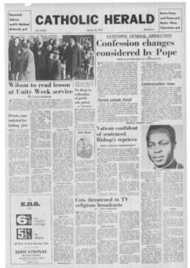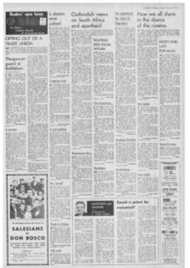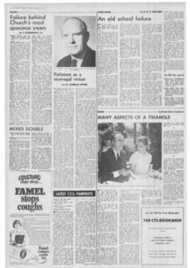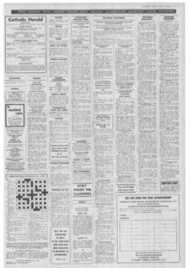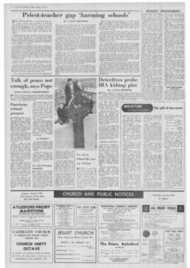Page 1, 15th January 1971
Page 1

Report an error
Noticed an error on this page?If you've noticed an error in this article please click here to report it.
Tags
Share
Related articles
Tv Centre Chief Warns Politicians
Television Masses Defended
Irish Tv
Fight To Prevent Cuts In Religious Broadcasts
Watch This Space On 'god-slots'
Cuts threatened in TV religious broadcasts
BY A STAFF REPORTER
MOUNTING pressure to reduce the amount of religious broadcasting on Sunday evening television could, in the view of some inside observers, represent a threat to the very existence of such broadcasting in the future.
BBC and ITA have been approached to agree on a policy Which would cut the agreed transmission time granted on saniday evening to the churches from 70 to 45 minutes. For 15 years there has been in existence a gentleman's agreement between the various governments and the TV networks that ' religious programmes be shown on Sunday between 6.15 p.m. and 7.25 p in.
The suggestion emanates hum a joint working party of the Independent Television Authority and the Central Religious Advisory Committee (CRAC). The Independent Television Authority is in favour of the change, whereas the BBC is keeping its views confidential until March. CRAC itself has yet to reach its conclusion on the plan.
Although views of clergymen engaged in broadcasting vary on the desirability of altering the present Sunday evening arrangements, majority opinion inside the Anglican and Catholic bodies is against the change.
MORE EFFECTIVE
Those in favour argue that religious broadcasting, by taking its turn with other types of programme at ordinary viewing times, would be more effective, and would at the same time have to raise its standards.
Opponents see the move as an attempt either by those hostile to religious broadcasting in itself, or by independent television companies hungry for more revenue, which secular programmes would give if put out during the present "religious" time.
In the ITV 1971 handbook an article on religion says that large numbers of viewers have, in the past, tended to switch off after the news on Sunday when they knew that religious programmes were to follow. It quotes a survey conducted by ITA on "Religion in Britain and Northern Ireland" which said: "For instance, the bulk of viewers whose religious commitment was slight, gave as their first reason for switching off their objection to 'having religion crammed down their throats'." It also indicated that discussion programmes were failing in their main object of making people think.
Bishop Holland, chairman of the Mass Media Commission, confirmed that he was not in favour of changing the present arrangements. People feared that it would in practice result in a net loss of religious broadcasting time.
A spokesman for the Church Information Office said of the proposal: "It seems unlikely that it will be received with favour, unless far more convincing reasons are given for the proposed cut than have so far been made public."
A spokesman for the ITA said : "It is not the intention of the Independent Television Authority to cut down on the number of hours of religious broadcasting."
blog comments powered by Disqus


